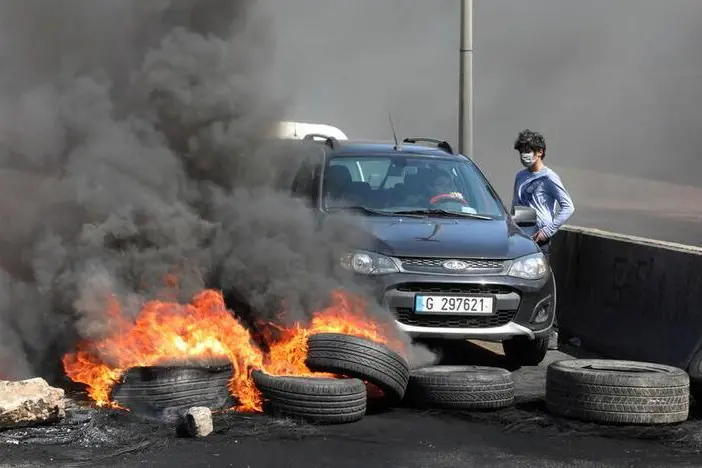PHOTO
BEIRUT- Lebanon's president told security forces to prevent roadblocks after protesters shut main roads across the country for a seventh straight day on Monday in anger at more than a year of economic crisis and months of political paralysis.
Measures agreed in a meeting with security and government officials included ordering a crackdown on anyone violating monetary and credit laws, including foreign exchange bureaus, a statement said.
Since the Lebanese pound, which has lost 85% of its value, tumbled to a new low last week, protesters have blocked roads daily.
"We have said several times that there will be an escalation because the state isn't doing anything," said Pascale Nohra, a protester on a main highway in the Jal al-Dib area.
As Lebanon's financial crisis erupted in late 2019, a wave of mass protest rocked the country, with outrage boiling over at leaders who have overseen decades of state graft.
Tens of thousands of jobs have been lost, bank accounts have been frozen and many have been plunged into poverty.
On Monday, three main roads leading south into the capital were blocked while in Beirut itself, protesters briefly closed a road in front of the central bank.
In Tyre in the south, one man tried to burn himself by pouring gasoline on his body but civil defence members stopped him in time, the state news agency said.
In Tripoli in the north, one of Lebanon's poorest cities, demonstrators built a brick wall one metre high to prevent cars from passing through allowing a pathway for emergency cases.
Lebanon's army chief held a separate meeting with military commanders also on Monday in which he stressed the right to peaceful protest but without damage of public property.
General Joseph Aoun warned however of an unstable security situation, adding that military officers were also suffering economic hardship.
"The officer also is suffering and is hungry, to the officials I say, where are you going What are you waiting for What are you planning to do" he said in a statement.
PRESSURE
"The new developments on the financial and security fronts must be tackled quickly," the presidency statement said.
After a port explosion devastated whole tracts of Beirut in August and killed 200 people, Caretaker Prime Minister Hassan Diab's government resigned.
But the new prime minister-designate, Saad al-Hariri, is at loggerheads with President Michel Aoun and has been unable to form a new government that must carry out the reforms needed to unlock international aid.
On Saturday, Diab threatened to quit even caretaker work to raise the pressure on those blocking the formation of a new government.
Maronite Patriarch Bechara Boutros al-Rai hit out at politicians in his Sunday sermon: "How can the people not revolt when the price of one dollar has surpassed 10,000 Lebanese pounds in one day, how can they not revolt when the minimum wage is $70"
Rai has called for an U.N.-sponsored international conference to help Lebanon.
(Reporting By Maha El Dahan, Laila Bassam, Ellen Francis and Beirut bureau; Editing by Kevin Liffey, Angus MacSwan, William Maclean) ((Maha.Dahan@thomsonreuters.com; + 9712 4082101; Reuters Messaging: maha.dahan.thomsonreuters.com@reuters.net))





















